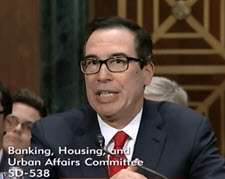As expectations grow that the Supreme Court will rule on the issue of state and local taxation of internet purchases by this summer, Treasury Secretary Steven Mnuchin recently testified before two congressional committees about President Trump’s support for an online sales tax.
 |
Treasury Secretary Steven Mnuchin recently testified before two congressional committees about President Trump’s support for an online sales tax. |
During a hearing before the Senate Banking Committee, Mnuchin addressed taxing online purchases through the Marketplace Fairness Act, stating: "[T]he president fundamentally supports the idea of some type of sales tax across the board ... There are aspects of that he likes a lot and he looks forward to working with you and others on it." (Video of Exchange with Sen. Jon Tester (D-MT), C-Span, Jan. 30)
At a Feb. 15 House Ways and Means Committee hearing, Mnuchin said the president "does feel strongly" that the U.S. should impose a sales tax on purchases made over the Internet. (Bloomberg, Feb. 15)
The U.S. Government Accountability Office (GAO) released a study in December estimating that state and local governments could have collected an estimated 8 to 13 billion dollars in 2017 if states were given authority to require sales tax collection from all remote sellers. (GAO report, Dec. 18, 2017). The Roundtable has recommended that sales taxes collected from on-line consumer purchases may provide a reliable source of state and local revenue to help pay for President Trump's recently proposed infrastructure re-building plan. (Roundtable Weekly, Jan. 26, 2011.)
The Supreme Court is scheduled to hear oral argument in South Dakota v. Wayfair, Inc., on April 17 to resolve the constitutionality of collecting sales and use taxes that are due on Internet purchases. The high court is expected to render a decision by the end of June. (Roundtable Weekly, Jan. 12)
The International Council of Shopping Centers, Investment Program Association, Nareit®, and the National Association of REALTORS® will join The Roundtable on an amicus brief to be filed early next month in Wayfair, urging the Supreme Court to overturn a pair of decades-old opinions prohibiting states from imposing sales and use tax collection obligations on web-based, catalog, and other retailers lacking an in-state physical presence. The upcoming brief will re-iterate many of the points that the real estate coalition set forth in an initial amicus brief filed last November (Roundtable Weekly, Nov. 3, 2017.)
The Real Estate Roundtable on Wednesday wrote to Treasury Secretary Steven Mnuchin regarding the new limitation on business interest deductibility created in the Tax Cuts and Jobs Act, including rules that allow taxpayers to continue fully deducting interest related to commercial real estate debt. (Roundtable letter, Feb. 21)
 |
The Feb. 21 Roundtable letter urges that Treasury clarify that interest (other than investment interest) on debt that is allocable to an owner of an entity engaged in a real property trade or business is exempt from the new business interest limitation rule – if that trade or business has elected out of the rule. |
The exception for interest allocable to a real property trade or business reflects policymakers' understanding that limits on the deduction for interest expense could have enormous negative consequences for property values, real estate markets, and economic growth. (Reference: Real Estate Forum, Jan/Feb 2018, Decoding The New Tax Bill)
The Feb. 21 comment letter requests clarification to ensure the real estate exception operates as intended for common real estate ownership arrangements – focusing on the scope and application of the exception for an electing real property trade or business.
The letter urges that Treasury clarify that interest (other than investment interest) on debt that is allocable to an owner of an entity engaged in a real property trade or business is exempt from the new business interest limitation rule – if that trade or business has elected out of the rule.
As relevant examples, the letter describes four common scenarios where the financing of a real property trade or business occurs through a tiered structure. The letter demonstrates why treating the interest expense of an upper-tier entity as properly allocable to the real property trade or business of a lower-tier entity is consistent with the legislative intent and conforms with existing tax rules and principles.
The letter also addresses the allocation of indebtedness within entities, requesting that Treasury guidance apply the tracing rules found in existing authorities, which are already used for purposes of the passive loss rules.
During a Feb. 20 tax conference, both Treasury's Deputy Tax Legislative Counsel Krishna Vallabhaneni and Deputy Assistant Secretary for Tax Policy Dana Trier said a notice on language limiting interest expenses under the new tax law will be issued soon. (Bloomberg Law, Feb. 20).
This week's letter is a follow-up to a Jan. 18 Roundtable letter, which identified several areas where Treasury rulemaking would reduce uncertainty and facilitate continued investment. [Roundtable Weekly, Jan. 19]
As Treasury and Congress continue to focus on implementation and technical corrections to the new tax law, The Roundtable and TPAC will play an active role in seeking appropriate clarifications affecting the most significant changes to the tax code in more than three decades.